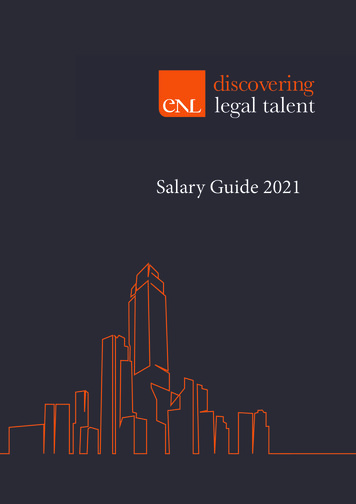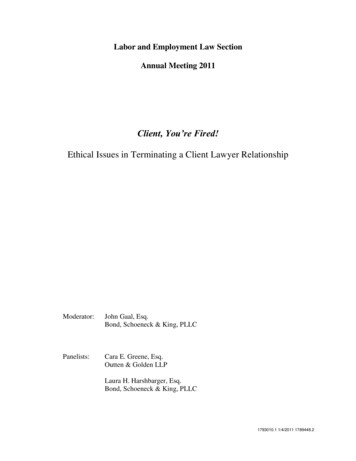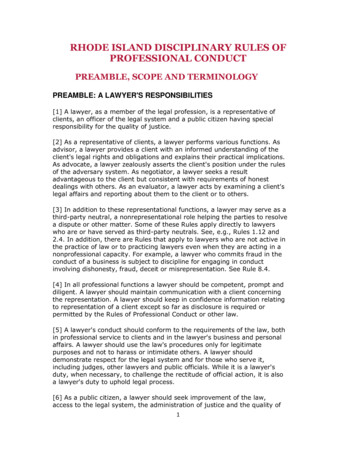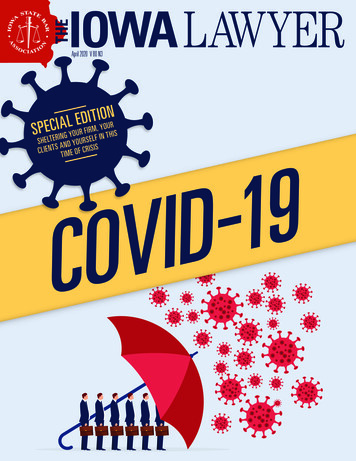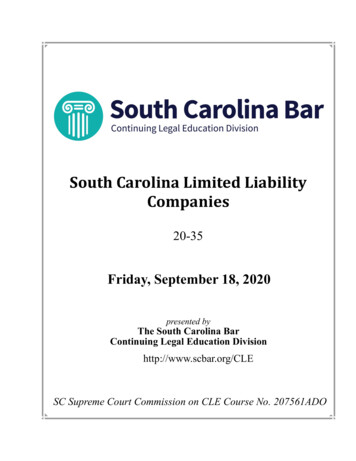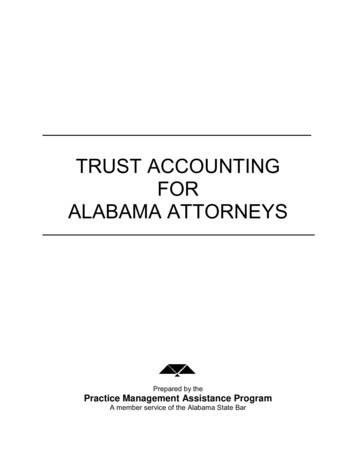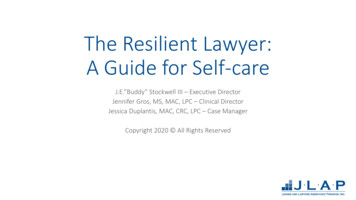
Transcription
The Resilient Lawyer:A Guide for Self-careJ.E.”Buddy” Stockwell III – Executive DirectorJennifer Gros, MS, MAC, LPC – Clinical DirectorJessica Duplantis, MAC, CRC, LPC – Case ManagerCopyright 2020 All Rights Reserved
Objectives:IDENTIFY STRESS ANDANXIETY TRIGGERSAND SYMPTOMSDISCUSS LAWYERSPECIFIC TRAITSIDENTIFY HEALTHYAND UNHEALTHYCOPINGIDENTIFY SHORT- ANDLONG-TERMWELLNESS GOALSLEARN TIPS FORRESILIENCYLEARN ABOUT JLAPAND JLAP SERVICES
What is Stress? Is it the same as Anxiety?StressAnxiety Typically caused by an externaltrigger Work deadlines, fight with aloved one, poverty, chronicillness, etc. Persistent, excessive worries thatdon’t go away even in theabsence of stress
The symptoms are similar OverwhelmedRestlessCryingAlcohol or drug useImpulsivityForgetfulnessSleep disturbancesPoor judgmentIndecisivenessIrritated and angryheadaches Nausea/vomiting Impatience Inability to relax Aggressiveness Sweating Muscle tension Difficulty concentrating Easily startled or jumpiness Loss or increase in appetite Fear or panic
Is Stress bad?
Changing “Distress” to “Eustress” Focus on the resources you need to meet the challenge Seeing the potential benefits of a situation Reminding yourself of your strengths Having a positive mindset (aka optimism)
Can “bad” Stress be reframed?
It’s tougher for lawyers . . .Two primary traits of a Lawyer:1. Perfectionism2. PessimismNegative outlook high risk for stress and anxiety
The impact of stress on self-care Obsessive thoughts Feelings of inadequacy Difficulty concentrating A sense of worry and/or impending danger Sleep disturbances Heart palpitations Sweating, fatigue and muscle tension
SIDEBAR: COVID 19 and StressJust when we thought practicing law couldn’t get more stressful . . . We DON’T know the ultimate impact of COVID 19 on the legal profession We DO know that maintaining mental and physical health is paramount More than ever, it pays to take care of yourself and be ready for anything
e.g.: Are Zoom Meetings Stressful?Is it a “Brave New World” of glitchy and distanced communications?
COVID 19 Stress and Anxiety Tips1.2.3.4.5.6.Take a media breakTake care of your bodyTake care of your mindCatch up on your hobbiesConnect with othersBe thankful
Take a media breakProlonged exposure to the news and video “screens” can impact yourmental health in a negative way.Ask yourself: do you feel calmer after watching the news?Turn the screens off and go for a walk or bicycle ride around yourneighborhood, work in the garden, read a book outside, etc. Getcreative. Fresh air and sunlight bring a positive effect on mood.
Take care of your body Fuel your body by eating a healthy, well-balanced diet and drinkingplenty of water Aim to get seven to eight hours of sleep each night Exercise every day, even if just a walk around the block Take deep breaths and stretch often Avoid risky or destructive behaviors such as abusing alcohol or drugs,excessive gambling or ignoring public health recommendations Get out and about some but follow social distancing guidelines
Take care of your mind Mental health conditions are by nature isolating, stay connected. Keep the routines that make you feel good and try to modify the onesthat you can. Reach out to friends and schedule virtual hangouts. Find an accountability and support buddy. If you have a therapist, see if they offer telephone or video-basedsessions. Make sure you have enough medication on hand.
Connect with othersSocial distancing does not mean social isolation.Check up on your extended family, friends and neighbors. Contact oldfriends you haven’t spoken to in a while. Share your feelings with peopleyou trust about how the pandemic is affecting you. Connecting withother people helps us feel safer.
Renew your interest in hobbiesWhat hobbies have you been putting off because you are always toobusy? What new hobbies would you like to learn?During the pandemic and with stay at home orders, many people havehad more down time from work and have increased life-balance.It’s healthy to use some of that down time to renew old hobbies or takeup new ones. It’s also an opportunity to maintain better life balance inthe future when things get back to the “new normal” post-pandemic.
Be thankful for what you haveMaintain a viewpoint of Gratitude.Research shows that having a positive attitude can improve your healthand help minimize negative thoughts and anxious feelings. Find agratitude partner and share with them one thing daily that you aregrateful for during this unprecedented moment in our history.Or, write a “Gratitude List” at the end of each day to help keep inventoryof all the good things in your life.
Symptoms to watch for:1.2.3.4.5.If any of these things become persistent or interfere with dailyfunctioning contact your provider for help and guidance:Trouble focusing on daily activitiesAnxiety that turns into feelings of being out of controlStrong feelings that interfere with daily activitiesHaving emotions that become difficult to manageFeelings of hopelessness or helplessness
SUPPORT GUIDE FOR COVID-19https://louisianajlap.com/covid-19/
And now . . . back to Lawyer ResilienceLong before the COVID 19 Pandemic, the data has proven that the legalprofession suffers high rates of depression and substance use disorders.Education and information can reduce the incidence of these issues.
What is depression? Not the blues Persistent feeling of sadness and loss of interest Can’t just snap out of it Affects how you feel, think and behave Can lead to emotional and physical problems Not a weakness Noticeable problems causing a negative impact on day-to-day activities
What depression looks likeImbalance of serotonin, norepinephrine, and dopamine (Image courtesy of Mayo Clinic)
Depression signs and symptoms Decreased motivation Easily irritated Poor appetite or overeating Low energy Hopelessness Difficulty concentrating Isolative Excessive worry Low self-esteem Overreacting to situations Tearfulness Decreased interest in onceenjoyable activities Difficulty relating to others Recurring thoughts of death
Profession-specific statistics Lawyers and judges have fourth highest suicide rate – 6x higher than generalpopulation (behind doctors, dentists, and pharmacists) Lawyers and judges are 2x as likely as general population to suffer substance abuseand other addictive disorders 1/3 of lawyers and judges suffer from depression, which can begin in law school Out of 105 professions, lawyers and judges near top of list in major depression Those suffering from intense perfectionism at higher risk for suicide
A lawyer’s mental, emotional andphysical state affects their duties to:The ClientThe CourtThe Profession
Louisiana Rules of Professional ConductRule 1.1 (a) CompetenceA lawyer shall provide competent representation to a client.Competent representation requires the legal knowledge, skill,thoroughness and preparation reasonably necessary for therepresentation.
Are You Overwhelmed?When you are depressed, stressed, overwhelmed or burned out you may notbe making the best decisions or seeing all aspects in a case.
Coping StrategiesMaladaptive coping behaviors by lawyersseeking some control: Self-medicating with alcohol and othersubstances. Food disorders Gym Anorexia Unhealthy Sexual Behaviors Compulsive Video Gaming Hair Pulling Isolation and withdrawal from friends andfamily “Stuffing” feelings and ignoring mental healthconcernsLawyers "intellectually know" thefoundations of a healthy lifestyle: Healthy DietDaily Meditation to find an “Off Switch”Aerobic Exercise at least 3 times per week8 Hours of Sleep
Why lawyers resist basic healthy habits Employer’s demands for billable hoursClients’ demands on top of employer’s demandsLack of control over calendar and schedulingMisconception that excessive self-sacrifice is required (began in law school)Allowing demands of practicing law to dictate time left for friends and familyThe demands of law can’t be controlled, only perfectionism in law can beWanting to appear tough and invincible
The issues with lack of sleep Chronic sleep deprivation is linked to deficits in- Reasoning- Global cognitive status- Vocabulary Highest predictive value for depression Greater rate of burnout Increases heart attacks, blood pressure, strokes Less than 6 hours 30% rise in obesity
This should be easier!
2016 STUDY“The Prevalence Of Substance Use and Other Mental Health ConcernsAmong American Attorneys” By: Patrick Krill, JD, LLM; Ryan Johnson, MA; Linda Albert, MSW Published in Journal of Addiction Medicine: January/February 2016 19 states participated via voluntary, online confidential ABA survey 12,825 licensed and employed attorneys participated
Mental Health in the Legal ProfessionParticipants over the course of their legal career: Anxiety 61.1% Depression 45.7% ADHD 12.5% Panic Disorder 8.0% Bipolar Disorder 2.4% 11.5% reported suicidal thoughts during their career
30.00%25.00%20.00%Alcohol Use ers
BALANCE and WELL-BEING . . .ARE ABSOLUTELY ACHIEVABLE!
There is no magic formulaIt takes learned, intentional, and specific health habits to carve-out andprotect one’s daily mental and physical health while practicing lawTHESE HABITS NEED TO BE DEVELOPED NOW
But how?
Develop an attitude of gratitudeMake it a habit to expressappreciation in all parts of yourlife, on a regular basis, for boththings big and small alike
Learn flexible optimism Flexible optimism allows us to judge whenoptimism is more adaptive than pessimism. Optimism increases engagement in life anddecreases dysfunctional thinking such as“catastrophizing” small setbacks.
Practice mindfulnessMindfulness is a mental stateachieved by focusing one'sawareness on the presentmoment, while calmlyacknowledging and acceptingone's feelings, thoughts, andbodily sensations, used as atherapeutic technique.
MeditateBenefits of meditation: Lower stress and anxiety Increase focus and productivity Let go of unwanted habits Better handle difficult events Increase self-awareness
Due to the nature of the work, lawyers: Spend large amounts of theirtime focusing keenly on solvingpuzzles of the past and craftingplans and predictions on thefuture Spend little or no timerecognizing, appreciating, andaccepting the actual “presentmoment” of their immediatesurroundings
The paradox: Lawyers experience high rates of stress and anxiety An effective approach to reducing anxiety is mindfulness and meditation Mindfulness and meditation require scheduling time periods on a routinebasis wherein you stop ruminating, analyzing, judging and predicting andinstead surrender all analytical and judgmental thought and focus on Being Lawyers are typically uncomfortable at first because their professional selfworth rests upon tremendous dedication in the realm of complex Thinking Lawyers tend to believe that only thinking is an effective tool to deal withany issue and it is implausible that NOT thinking can help solve a problem
Find purpose Purpose guides life decisions, influences behaviors, shapes goals andoffers a sense of direction. Often connected to a vocation – meaningful and satisfying work What gets you up in the morning?
Build meaning into your work Work is meaningful when we believe:- It matters- It’s valuable- It contributes to personal growth/greater good- It’s a good fit with your values Seek variety Seek connection
The benefits of meaning and purpose Better emotional regulation Reduced risk of depression and anxiety Reduced substance abuse Healthy sleep Improved cardiovascular health
But for the short term
Just the tip of the iceberg
Attorneys are Resilient!Psychologists define resilience as the process of adapting well in the faceof adversity, trauma, tragedy, threats or significant sources of stress —such as family and relationship problems, serious health problems, orworkplace and financial stressors. . That's the role of resilience.
Make ConnectionsBuilding ResiliencyAvoid seeing crises as insurmountable problemsAccept that change is part of livingMove towards your goalsTake decisive action
Nurture a positive view of yourselfBuilding ResiliencyLook for opportunities for self-discoveryKeep things in perspectiveMaintain a hopeful outlookTake care of yourself
Building ResiliencyAdditional ways of strengthening resilience may be helpful. For example,some people write about their deepest thoughts and feelings related tostressful events in their life. Meditation and spiritual practices often helppeople build a sense of connection.The key is to identify activities that are likely to work for you as part of yourown personal strategy for fostering resilience.Adapted from “The Road to Resilience”American Psychological Association, 2015
How Can JLAP Help?
Today’s JLAP is Comprehensive Two (2) Licensed Professional Counselors,qualified to diagnose and assist with ANYMental Disorder in the DSM 5 Also, skilled expertise in the specialized area ofsubstance use disorders and both are MasterAddiction Counselors Hands-on clinical experience in actual SUDtreatment JLAP’s Executive Director is a Certified ClinicalInterventionist JLAP is now a top-tier professionals’ programwith striking success rates
What we do and who we serve:ServicesReferral SourcesAssessmentInformation and ngLawyer Support GroupsVoluntary Self Family PeersLaw Schools and Law FirmsCommittee on Bar AdmissionsOffice of the Disciplinary CounselJudiciary Commission
Top reasons for not seeking help: Fear of losing law license Social stigma Privacy concerns Financial reasons or loss of income while in treatment Belief that they could handle problems on their own Not having enough time
JLAP’s Primary MissionConfidential HelpJLAP is first and foremost an absolutely confidential method of providinglife-saving help to an impaired lawyer, judge, law student or familymember.Protecting the PublicEarly intervention and help reduces the damage that impaired legalprofessionals visit upon the public.
If I call JLAP, what happens next? Clinical interview with a Licensed Professional Counselor Absolutely Confidential and Privileged Caller Can Remain Anonymous JLAP Offers Suggestions on How to Assist Referral to appropriate services Caller Decides How to Proceed, NOT JLAP Follow up by JLAP Clinician JLAP NEVER REPORTS ANYTHING TO ANYONE WITHOUT PERMISSION
Reach out to JLAP TodayJLAP provides CONFIDENTIAL assistance, support, and resources to impaired lawyers,judges, law students or family members. JLAPs mission is to reduce the stigmaassociated with mental health issues that impact the legal profession.Judges and Lawyers Assistance Program, Inc.(985) m
Resource Page: d-for-you “How lawyers can avoid burnout and debilitating anxiety”; LESLIE A. GORDON 2015;ABA JOURNAL epression-seriously-what-isit/ ression/symptomscauses/syc-20356007 “The Anxious Lawyer; an 8-Week Guide to a Joyful and Satisfying Law PracticeThrough Mindfulness and Meditation”, Jeena Cho and Karen Gifford 2016 ABAPublishingCopyright 2020 All Rights Reserved
There is no magic formula. It takes learned, intentional, and specific health habits to carve-out and . life, on a regular basis, for both things big and small alike. Learn flexible optimism Flexible optimism allows us to judge when optimism is more adaptive than pessimism. Optimism increases engagement in life and decreases .


